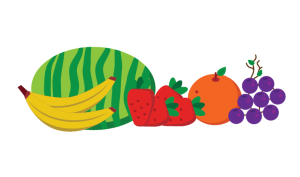Project Type
The type of OER project you will engage in will become clear after reviewing the list of existing open resources (OER Course Map) and identifying the gaps or lack of alignment with your teaching practice.
Two types of OER projects are an adaptation and a collection. An adaptation also called a derivative, mixes or remixes a copyrighted work to create a new original copyrighted work. A collection is the assembly of separate and independent works into a collective whole. These two types are discussed more below.
Adaptation
 The term adaptation is commonly used to describe the process of making changes to an existing work. We can also replace “adapt” with revise, modify, alter, customize, or other synonym that describes the act of making a change. This concept can be illustrated with a smoothie. Individual fruits are blended together and result in a new creation. The individual ingredients are no longer distinguishable. Nevertheless, attribution for the individual works is still required.
The term adaptation is commonly used to describe the process of making changes to an existing work. We can also replace “adapt” with revise, modify, alter, customize, or other synonym that describes the act of making a change. This concept can be illustrated with a smoothie. Individual fruits are blended together and result in a new creation. The individual ingredients are no longer distinguishable. Nevertheless, attribution for the individual works is still required.
Some Creative Commons licenses allow others to make adaptations or remixes. It’s important to understand what an adaptation is and to review the licensing of materials before deciding to adapt (see next section). The Creative Commons FAQs provide examples and explanations.
Using information and media from an open textbook or other open educational resource is NOT considered plagiarism.
Examples of adaptations include:
- a screenplay based on a novel
- a book translated from one language to another
- a chapter in an open textbook that blends multiple open educational resources.
The new work must be derived from the copyrighted work.
Adapting open resources can be a good place to start, and there are many reasons why you would revise existing work:
Reasons for Adaptation
- Address a particular teaching style or learning style
- Adjust for a course level.
- Customise for your curriculum
- Adapt for a different discipline.
- Address diversity needs.
- Customize for a Canadian audience, or perhaps for students in Ontario.
- Make the material more accessible for people with disabilities
- Add material contributed by students or material suggested by students
- Translate the material into another language
- Correct errors or inaccuracies
- Update the book with current information
- Add more media or links to other resources
- Use only a portion of the book for a course
Collection
 A collection is the assembly of separate and independent works into a collective whole. Each work in a collection retains its copyright protection and licensing terms. Each individual work in a collection must have attribution and licensing information.
A collection is the assembly of separate and independent works into a collective whole. Each work in a collection retains its copyright protection and licensing terms. Each individual work in a collection must have attribution and licensing information.
While an adaptation can be compared to a smoothie, a collection is more like a fruit salad. Each work — the strawberries, blackberries, apples, etc. — is part of the collection which is the fruit salad.
While a separate copyright exists for the collection, it only applies to the new contributions to the work such as the cover, the introduction, and the actual arrangement of the selected works (think about the fruit choices you might make for a fruit salad to create your own unique combination of flavors).
Examples of collections include:
- anthologies of writings by various authors;
encyclopedia; - a coffee table book featuring photographs by various photographers; and,
- an album compilation of ’80s pop hits.
As with adaptations, the licensing of a collection must be compatible with the copyrights and licenses of the individual works. The license for the collection does not alter the licenses for the works in the collection. For more information, consult the Creative Commons FAQs
“Creative Commons: Understanding Adaptations & Collections” from Creative Commons Libguide by the College of Coastal Georgia is licensed under an Attribution-NonCommercial-ShareAlike 4.0 International License
“1. Definition of Adapt” & “2. Reasons to Adapt an Open Textbook” from Adaptation Guide by BCcampus is licensed under a Creative Commons Attribution 4.0 International License, except where otherwise noted.

